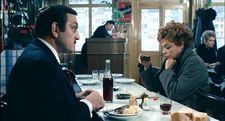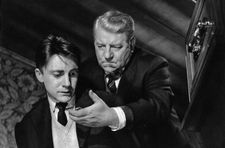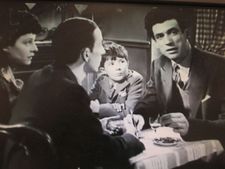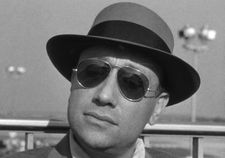In the second installment of my conversation with Bertrand Tavernier on his Voyage À Travers Le Cinéma Français we go towards Ernst Lubitsch's Heaven Can Wait, Lino Ventura and Jean-Pierre Melville, Jean Gabin in Jean Delannoy's adaptation of Georges Simenon's Inspector Maigret, Bernard Blier in Henri Verneuil's Le Président, Nadja Tiller in Gilles Grangier's Le Désordre Et La Nuit, Eddie Constantine, and composers Jean-Jacques Grunenwald, George Van Parys, and Paul Misraki.
Martin Scorsese critiquing a Robert De Niro performance in a film by another director is unimaginable to Bertrand. "Distance is important to give you a wider vision of things."
 |
| Lino Ventura to Bertrand Tavernier on Jean-Pierre Melville: "I want to be sure that the hyena is not under the table." |
Anne-Katrin Titze: There is a moment in Voyage À Travers Le Cinéma Français where you describe the fight between Lino Ventura and [Jean-Pierre] Melville where they only communicate through a third person. I thought that this is pure Lubitsch. The Strables, the couple in Heaven Can Wait.
Bertrand Tavernier: This is in many comedies by Lubitsch where you have that. It is true. I witnessed that. And what is very funny, or interesting, is that it did not hurt the film. Because both Lino Ventura and Melville - they were such professionals that even if they did not like each other, the film was more important.
They were caring about the film. So they were hating each other, but really hating! I've had several times lunch in a restaurant with Lino Ventura. When he was arriving in the restaurant, he was looking under the table, saying "I want to be sure that the hyena is not under the table."
AKT: Wow. That's what he called him?
BT: Yes. Then you knew, there was a slight problem between them.
 |
| Jean Gabin with Serge Rousseau in Jean Delannoy's Maigret Et L'Affaire Saint-Fiacre: "There are some moments where he is boiling with anger..." |
AKT: I loved your compilation of angry Jean Gabin clips. That's fantastic.
BT: Because they are all different. Some are passionate. Some are cold, precise anger. When he says to the woman in Maigret tend un piège [copies Gabin as Inspector Maigret]: "Vous êtes bête, mais bête!"
AKT: It's great. Every actor should watch how to get angry with Jean Gabin.
BT: There are some moments where he is boiling with anger, some where he is more contained, and the moment where he is playing the president [Henri Verneuil's Le Président] and he is saying to [Bernard] Blier: "When you are married to a bank, you shut your mouth." It's like a knife. He is really killing him with one line.
AKT: The belly of your film are the two composers. Joseph Kosma was a new discovery for me. And I had no idea about all the links with Maurice Jaubert. You decided to put the two in the center of your film?
BT: Yeah, I think the composers are the most unsung heros of the history of cinema.
 |
| Jean Diego (Yves Montand) and Cricri (Christian Simon) in Les Portes De La Nuit: "Wonderful, beautiful, very well done by Marcel Carné." |
AKT: Ha, beautifully put.
BT: You never see a cinémathèque do a tribute to composers. Maybe, yes, maybe Ennio Morricone, John Williams. And maybe Alexandre Desplat now. They will do a tribute to an obscure B or C director, like Jesús Franco and never there will be anything about Jean-Jacques Grunenwald who did the score for the first two films of Robert Bresson, who did five or six films with Jacques Becker.
Who did maybe what is one of the best scores for French film, on La Vérité Sur Bébé Donge [by Henri Decoin]. This is an incredible score. Those composers are neglected, not talked about, not mentioned in history books and they brought so much to the films. I think the emotion at the end of La Grande Illusion is Renoir - the shot - but it's the music of Kosma.
Contrary to the Hollywood composers, they were not putting music all along the films. That was the choice of the directors. The music in all the great films was spare and the effect was devastating. Maurice Jaubert, the music of [Marcel Carné's] Le jour se lève, the music of Carnet de Bal. These are some of the most beautiful compositions of the French cinema of all periods.
AKT: You chose a great clip with Yves Montand starting to sing Les Feuilles Mortes [in Les portes de la nuit]. I noticed the reaction, like ripples, going through the people at the press screening because they recognized Autumn Leaves. And to go back to….
 |
| Bertrand Tavernier on Jean-Pierre Melville: "Lino Ventura and Melville - they were such professionals that even if they did not like each other, the film was more important." |
BT: …The birth!
AKT: The birth of the song!
BT: Yeah. The birth of the song. I mean, that's a good scene. And the shot is terrific. The attitude of the little boy in that shot is wonderful. Wonderful, beautiful, very well done by Marcel Carné.
AKT: What is the film you show where Gabin is with Lili Palmer, I think?
BT: No, it's Nadja Tiller. It's a masterpiece. It's called Le désordre et la nuit [The Night Affair]. It's a great film noir.
AKT: Eddie Constantine gets a shout out, of course. Did you feel it was difficult to decide what to leave out?
BT: That was very very difficult. But I am doing 8 episodes of 54, 55 minutes of that.
AKT: Continuing?
BT: It's not a longer version of the film. It's something totally different. I put in everything which I could not put in the film.
AKT: Can you talk about it?
BT: Just to mention a few people, some directors like Sacha Guitry, [Marcel] Pagnol, Max Ophüls, [Robert] Bresson, [Jean] Grémillon, Jacques Tati, the cinema of the occupation, people like [Henri-Georges] Clouzot, [Claude] Autant-Lara, [René] Clément, the forgotten directors. people who have been forgotten for decades like Raymond Bernard, like Jacques Tourneur, Anatole Litvak. The underrated directors, starting by the women directors. I have a whole episode of that.
_225.jpg) |
| On Martin Scorsese and Robert De Niro: "Can you imagine Scorsese putting a clip saying De Niro is less good in that film than in my film?" Photo: Anne-Katrin Titze |
AKT: Will you have spotlights on other actors as you have with Gabin?
BT: No but on other composers. From Jean-Jacques Grunenwald, to George Van Parys, Paul Misraki - I have many composers.
AKT: Did you sometimes feel limited because it was only French cinema and you wanted to make other links because you know cinema in general so well?
BT: No, no, no. I think one of the great things in a documentary is to impose some limits. No film has the pretension of telling the truth. It's only in our superficial view, which says, why don't you talk about the present in cinema? Because it's not the subject of the film. And because there would be a conflict of interest. I mean, Martin Scorsese doesn't mention … it stops when he is becoming a director.
After, how can you be objective? How would he be able to talk about the films of Robert De Niro not directed by him? Can you imagine Scorsese putting a clip saying De Niro is less good in that film than in my film? How can he do that? Memory is important and the time is important. The distance is important to give you a wider vision of things.
- Read what Bertrand Tavernier had to say on his odyssey through French cinema.
- Bertrand Tavernier talks about his dedication to Jacques Becker and Claude Sautet, Mireille Balin's dress in Macao, Jean Paul Gaultier and Falbalas, Sylvia Bataille and Jacques Lacan, and not having to see Rio Bravo again.








_600.jpg)













